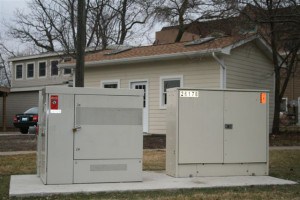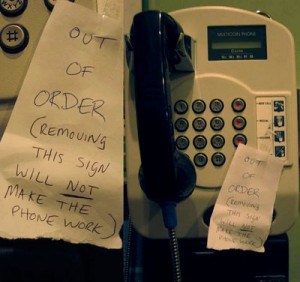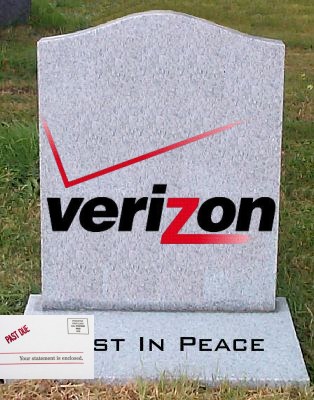 On January 27, 1878 America witnessed the establishment of its first telephone exchange run by the District Telephone Company of New Haven, Conn. In addition to bringing the first phone service to Connecticut, District Telephone also published the world’s first telephone directory. By the early 1920s, when America’s Bell System was taking hold in most cities, the company — now named Southern New England Telephone, had spread its network across most of the state. SNET prospered for decades until Southwestern Bell (SBC) bought the company in 1998. SBC rechristened itself AT&T in 2005. It has been all downhill from there for many customers.
On January 27, 1878 America witnessed the establishment of its first telephone exchange run by the District Telephone Company of New Haven, Conn. In addition to bringing the first phone service to Connecticut, District Telephone also published the world’s first telephone directory. By the early 1920s, when America’s Bell System was taking hold in most cities, the company — now named Southern New England Telephone, had spread its network across most of the state. SNET prospered for decades until Southwestern Bell (SBC) bought the company in 1998. SBC rechristened itself AT&T in 2005. It has been all downhill from there for many customers.
Today, AT&T Connecticut is the dominant phone company across the state, an unusual anomaly in the northeast, presided over mostly by Verizon Communications. They also dominate the inbox at the office of the state Attorney General, who receives regular complaints about the phone company’s performance in the state:
In 2008, AT&T began installing refrigerator-sized cabinets on telephone poles and in right-of-way locations, often within feet of homes. These Video Ready Access Devices (VRADs) connect AT&T’s U-verse fiber to copper wire telephone lines going to individual customers. Dubbed “lawn refrigerators” by critics, the boxes are not only an unsightly 4-6 feet tall, they are also often noisy because of internal cooling fans. More than one has burst into flames, thanks to malfunctioning power backup batteries found inside.

The perfect addition to any front yard... new boxes from AT&T. (Courtesy: Stopthebox.org)
AT&T’s often careless placement alienated residents, who complained they impeded views of turning drivers and pedestrians navigating sidewalks. Many suggested the boxes reduced property values, especially when installed in front yards without screening or shrubbery to partly hide them from view.
One Trumbull man took his ire all the way to the state Department of Public Utility Control (DPUC), eventually winning noise dampening and two AT&T-supplied pine trees for the box in his backyard.
By 2009, AT&T was realizing “cost savings” promoted in the deal to merge with SBC — by laying off engineers and technicians responsible for maintaining the company’s landline network. Service complaints soared, leading then-state Attorney General Richard Blumenthal to charge AT&T was cutting accountability for faulty phone lines and flimsy service. In fact, even as service quality deteriorated, AT&T was lobbying to dispense with service standards altogether, arguing disappointed customers had other choices.
“AT&T is literally hanging up on consumers — slashing jobs and service quality, even after violating state customer service standards,” said Blumenthal. “Our message to the DPUC: don’t let AT&T off the hook. Preserve customer service standards to protect consumers.”
In 2010, service complaints had grown so bad the DPUC finally acted, by fining AT&T the maximum amount possible — $1.2 million. Blumenthal called it a ringing wake-up call for AT&T.
But by December of last year, AT&T had still not paid the fine, and was caught by Blumenthal trying to negotiate a secret discounted settlement directly with the DPUC, cutting the state Attorney General out of the negotiations. Blumenthal released a statement blowing the whistle on the reported talks:

Blumenthal
“AT&T’s stalling should be stopped — and the fine enforced,” Blumenthal said. “This multibillion dollar company sought secret negotiations — cutting out my office and the public — to reduce its fine for failing to meet legally required service standards. We halted its concealment; and now AT&T should stop its delay in paying taxpayers the fine that it owes.”
“AT&T was fined for failing consistently, year after year over a decade, to fix phone lines in a timely manner. Failure to repair lines quickly endangers public health and safety, especially seniors and the handicapped for whom a working line is literally a lifeline.”
Richard Blumenthal went on to represent the state in the U.S. Senate, but his successor, George Jepsen is proving to be every bit as tenacious as the state’s new Attorney General. In March 2011, the DPUC formally imposed a fine of $745,000 on AT&T after negotiations with the phone company, which also required AT&T to meet its service standards. The fine was reduced because AT&T had previously made refunds and settlements with customers independent of the fine. The company is appealing it anyway.
“While I believe the full, $1.2 million penalty was warranted, the $745,000 fine sends a clear message to AT&T that it needs to improve its response to out-of-service customers.” Jepsen said. “The company’s responses in the future will be closely monitored.”
But has AT&T fixed the problems in the state of Connecticut? Judging from press accounts, the answer may be no.
James Bruni, who lives in Hamden, had U-verse installed in his new home back in December, and there has not been a day since when the service has worked properly.
“We have had tech after tech come into our home, each one telling a different story,” Bruni says. “When our TV [picture] freezes, our phone and Internet go out as well.”
When that happens, Bruni’s home alarm, connected to his U-verse phone line, is subject to going off as well. Many home alarm systems signal an alert if they detect a phone line has gone out of service, a possible sign of a robbery in progress.
Bruni has kept a log of AT&T’s comings-and-goings since December. He counts 23 technician visits, working both inside and outside of the home. When calling customer service, he is left on hold for extended periods, and often has to explain his issues repeatedly to technical support each time he calls. He takes virtually every service AT&T offers, but not for long.
 “I have had it with how I have been treated as a customer.”
“I have had it with how I have been treated as a customer.”
Former Bridgeport city councilman Gilberto Hernandez proves AT&T doesn’t treat the well-connected any better than anyone else in the state. Hernandez, now over 75, was so desperate to get repeating service outages fixed, he took his case to the consumer reporter at the Connecticut Post.
Hernandez’s wife is very ill, but he can’t depend on his AT&T landline to summon help in case of an emergency because it is always out of service.
Hernandez says the answer to his problem is a new overhead line installed through the neighborhood. But AT&T won’t pay for that. Instead of making an investment to correct long-term problems, the company prefers short-term fixes, which often fail within days. Performing short term repairs may help boost on-time appointment and service repair requirements, but when not followed up with more extensive repairs and upkeep, the problems just keep coming back.
The Post reporter sought an explanation from AT&T about Hernandez’s problems, and the phone company forwarded the matter to the company’s hired gun — the public relations firm of Fleishman-Hillard. After a delay, the firm told the reporter Hernandez signed off on AT&T’s repairs… four days before Hernandez called to report there was a problem.
The reporter summarized AT&T’s performance in Connecticut as spotty:
During the hearing [over AT&T’s quality of service], AT&T defended its record, saying it already paid people off for the rotten service by not charging them for the time their phones were out and for crediting them and paying other penalties to the tune of $5.3 million between 2001 and 2008.
The DPUC did find AT&T was particularly good at reducing the number of troubles reported per 100,000 customers and showing up for maintenance appointments. AT&T has met appointments for repair work more than 90 percent of the time. Installation of new service is also a strong suit for AT&T, where it showed up for more than 99 percent of appointments. The company also installed new service within five days of ordering more than 95 percent of the time.
But repairing stuff, at least within 24 hours, is not AT&T’s bag. The company never managed to put better than 72 percent of repairs back in service within 24 hours between 2001 and 2008.
 Accidents can be forgiven, but when AT&T’s repair crews take nearly a week to fix them, they are rarely forgotten.
Accidents can be forgiven, but when AT&T’s repair crews take nearly a week to fix them, they are rarely forgotten. AT&T claims they had to dig down at least 12 feet to reach and repair the affected cable, and told the newspaper it would take up to a week to restore service, and it did. But many customers were infuriated they were kept in the dark on the company’s progress, and others had trouble convincing AT&T to forward affected calls to unaffected cellphones and other working numbers.
AT&T claims they had to dig down at least 12 feet to reach and repair the affected cable, and told the newspaper it would take up to a week to restore service, and it did. But many customers were infuriated they were kept in the dark on the company’s progress, and others had trouble convincing AT&T to forward affected calls to unaffected cellphones and other working numbers.

 Subscribe
Subscribe






